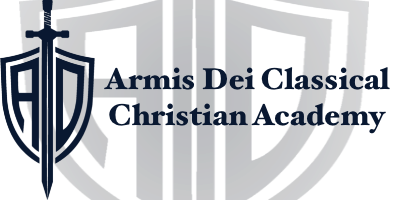Grammar, Logic, & Rhetoric Stages Curriculum Goals
Bible: We seek to:
1. Have the students read the scriptures in context for themselves vs. only prescribed verses.
2. Understand God’s word through a historical-grammatical interpretation of the Bible.
3. Let the Scriptures speak for themselves with clarifications and illustrations by the teacher.
4. Teach the biblical pattern of salvation: Law before Grace.
5. Encourage each student to come to the Father, through the Son, and to grow in their knowledge and love of Him.
6. Equip our students with a Christian worldview that will serve as a lens through which they see every other subject and all of life.
7. Equip our students to graciously and wisely defend their faith as they refute unbelief in its various forms.
English: We seek to:
1. Equip every student with the skills necessary for good writing, including correct spelling and grammar, pleasing style, clarity of focus, proofreading, and self-correcting.
2. Emphasize good writing by requiring the students to write often and correctly in each subject area.
3. Encourage clear thinking by the students by requiring clear, focused, well-argued writing.
Reading/Literature: We seek to:
1. Use phonics as the primary building blocks for teaching students to read.
2. Introduce the students to high-quality literature.
3. Carefully monitor the student’s reading abilities to ensure he/she is comprehending adequately and is reading fluently, both orally and silently.
4. Wherever possible, integrate subjects like history and science into reading.
5. Foster a life-long love of reading as our students are acquainted with great western literature.
6. Encourage students to read literature that stretches their comprehension skills.
Latin: We seek to:
1. Instruct the students in vocabulary and grammar to increase their fundamental understanding of English, the history and writings of Western Civilization, and the Romance languages.
2. Reinforce the students’ understanding of English grammar.
3. Cultivate study and logical thinking through the study of Latin.
4. Encourage delight, curiosity, and attentiveness in students by teaching them to see the world through the eyes of another language.
5. Provide students with the tools necessary to access original texts of our classical and Christian heritage.
Mathematics: We seek to:
1. Ensure that the students have a thorough mastery of basic mathematical functions and tables.
2. Emphasize conceptual, as well as practical, understanding through the frequent use of multistep story problems and applications to other disciplines, especially science.
3. Illustrate God’s unchanging character through the timeless, logical, mathematical systems He gave to man through His gift of reason.
History/Geography: We seek to:
1. Teach the students that God is in control of history and He will determine its ultimate outcome (gospel prevails, great commission is fulfilled).
2. Enable students to see God’s hand in history by observing the effect His people have on history.
3. Encourage students to draw meaningful comparisons across different historical contexts.
4. Encourage students to display empathy for historical characters, understanding their actions and experiences in context.
5. Equip students to retrieve and evaluate information from a variety of sources.
6. Provide students with a working knowledge of the flow of history, especially the rise and fall of various civilizations, so that they can place new information in the appropriate context.
Science: We seek to:
1. Teach that a literal six-day interpretation of the creation account in Genesis is true and that the theory of evolution is false.
2. Teach the students the basic elements of both accounts and that both systems are based on either sound or unsound faith.
3. Show the students that, because God made the universe “ex nihilo”, it has inherent order which in turn makes it possible to hypothesize and experiment (scientific method), as well as to identify, classify, and categorize elements of creation.
4. Treat the study of science as a part of the study of history. That is, show the students the natural integration between the advances, individuals, and applications of science, with the development of historical events within the cultures studied.
5. Use many forms of instruction to teach science, particularly identifying, classifying, categorizing, experimenting, demonstrating, collecting, integrating with history and math, and experiencing guest lectures and field trips.
Art: We seek to:
1. Teach all our students the basic fundamentals of drawing to enable them to create adequate renderings.
2. Encourage the students to appreciate and imitate the beauty of creation in their own works.
3. Introduce the students to masters’ works of the Western culture.
4. Equip the students to knowledgeably use a variety of art media.
5. Enable our students to refine their artistic abilities and become more proficient.

 Donate
Donate